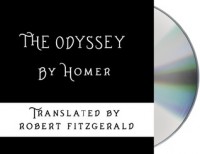Representation of Human: "The Odyssey" by Homer (translated by Robert Fitzgerald; read by Dan Stevens)

I humbly declare this book to be the greatest literary work of mankind. If you don't learn Greek (worth it just to read this Meisterwerk, never mind the rest of the immortal trove of Greek literature) you can read it in so many translations that have become classics in their own use of the English language, Fagles and Murray, just to mention two. Oh, what the Hades, let's throw in a third, not just for its brilliant translation, but also owing to the exotic character behind it: no less than Lawrence of Arabia.
The Homeric poems were sung in a less-enlightened time, in comparison with the later Greek tragedies, and with the later epics too. Apollonius' Argonautica was composed, post Greek Tragedy, and his audience would have been, no doubt, familiar with Euripides' Medea. Questions such as how justice and revenge affect societies were addressed by Aeschylus in the Oresteia; likewise, the reception of the anthropomorphic gods, and their pettiness, was raised by Euripides in Hippolytus and the Bacchae. Furthermore, the real nature and brutality of warfare was also raised in the Trojan Women. Throw in how one state views another state, and questions of racial identity, and you have The Persians by Aeschylus, and Medea by Euripides. Additionally, if you include Philoctetes by Sophocles, and the issue of how youth should conduct themselves is also raised. If you consider, too, Ajax by Sophocles, and you find that the bloodthirsty myths of an earlier age are filtered through questions that C5 Athenian society faced. What is better, the brute force of an unsophisticated Ajax, or the sophistry and rhetorical arguments of Odysseus in Ajax? By the time we arrive at Virgil, and The Aenied, brutal events such as the death of Priam by Neoptolemus in Aeneid Book II, are tempered with a more enlightened approach. Neoptolemus is condemned for killing Priam, and rightly so, as mercy is important, and exemplifies the Romanitas of 'Sparing the humble, and conquering the proud'. However, Aeneas doesn't show mercy in his killing of Turnus at the end of Book XII.
If you're into Greek Literature, read on.
 4
4



